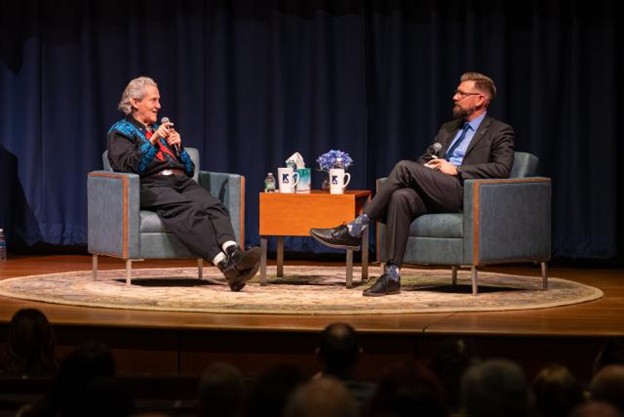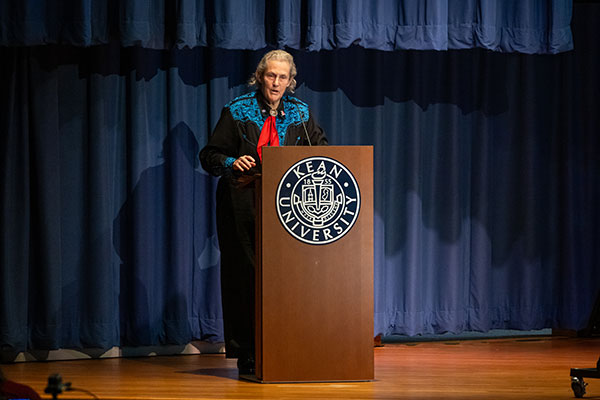Autism Advocate Temple Grandin, Ph.D., Addressed Kean University as Part of the President’s Distinguished Lecture Series
March 18, 2025


Kean University welcomed renowned autism advocate Temple Grandin, Ph.D., to campus, where she delivered an inspiring lecture on the power of different thinking styles and the importance of hands-on learning.
The event, part of the Kean University President’s Distinguished Lecture Series, drew a full house, including students, faculty and members of the community. Kean President Lamont O. Repollet, Ed.D., welcomed Grandin and acknowledged her profound impact on autism advocacy and education.
“At Kean, diverse perspectives are welcome and celebrated,” President Repollet said. “Temple Grandin’s advocacy and groundbreaking work embody the transformative power of inclusion. She reminds us that diversity includes neurodiversity.”
Grandin, known for her leadership in the autism community and her pioneering work in animal science, presented her lecture, The World Needs All Kinds of Minds, emphasizing the need to foster different ways of thinking in education and beyond.
“I’m trying to bust up the autism box,” Grandin said. “I want to see young people who think differently get out there and be successful. Kids are afraid of failing. But you learn from mistakes.”
The Grandin lecture was supported by Kean alumna Marjorie Slass ’13 M.A., ’16 Psy.D., and her husband, Jonathan Slass, who have a daughter on the autism spectrum. Their commitment to funding autism education was inspired by their personal experiences, and they expressed pride in being part of the event.
“She is the inspiration for why we want to fund autism education,” Marjorie Slass said. “We’re thrilled to be part of this.” Grandin also took part in a question-and-answer session moderated by James Konopack, Ph.D., dean, Kean University College of Health Professions and Human Services (CHPHS).
He noted that her work matches the goals of CHPHS. “Our mission is to prepare future professionals to provide culturally responsive, holistic, evidence-based care,” he said.
And, for many in the audience, Grandin’s message struck a chord.
“She was fantastic. So personable, and such a different way to see things,” said Aaron Gubi, Ph.D., an assistant professor, Kean University’s Department of Advanced Studies in Psychology. “I think her message is we need to be flexible and give neurodiverse thinkers different ways to use their skills.”
Grandin, a professor of animal science at Colorado State University and the author of numerous books, was diagnosed with autism as a young child. She learned to speak at age four with the help of education, speech therapy and encouragement. Spending childhood summers on a family ranch, she developed an early interest in the livestock industry and later became a leader in improving animal welfare. Her life story was told in an HBO movie that chronicled her journey and achievements.
During her lecture, Grandin spoke about the different ways people think and process information, describing three primary types of thinking: visual thinking, or thinking in pictures; spatial visualization, or thinking in patterns; and verbal thinking, or thinking in words. She also outlined strategies educators can use to support students with diverse ways of thinking, including encouraging “tinkering” and the exploration of different trades, providing opportunities for children to work outside the home early—such as volunteer jobs—to build skills and set expectations and connecting them with mentors to guide their development.
Children should be exposed to a broad range of experiences to help them discover their interests and strengths, she said. “You’ve got to get out and try stuff,” Grandin said. “I believe in trying on careers. It’s important to find out what you hate.”
Her lecture left a lasting impression on many in attendance, reinforcing the need to create learning environments that celebrate diverse thinking styles. Kean’s President’s Distinguished Lecture Series continues to bring influential thought leaders to campus, ensuring that students and faculty have access to inspiring voices that shape education, advocacy and research.